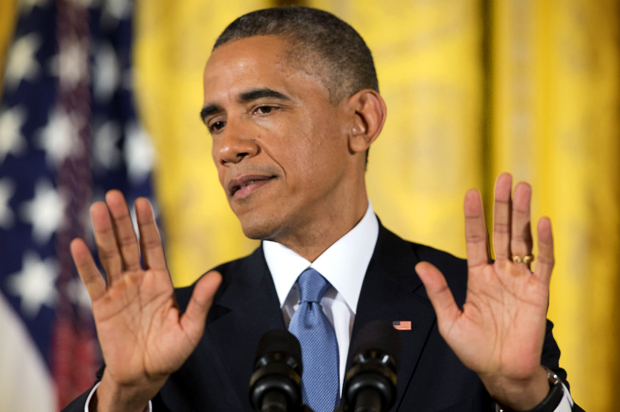The Republican Party won’t assume control of the U.S. Senate for another six weeks, but there’s already talk that President Barack Obama will soon brandish his veto pen.
That’s because the president believes that a tax deal negotiated by lawmakers in both parties makes permanent corporate tax giveaways while ignoring vital assistance for low- and middle-income Americans. The package — assembled by outgoing Senate Majority Leader Harry Reid; Democratic Sen. Ron Wyden of Oregon, the current Finance Committee chair; and GOP Rep. Dave Camp of Michigan, the House Ways and Means Committee chair who is retiring after the current session of Congress concludes — would cost an estimated $440 billion over 10 years.
Zach Carter lays out the provisions: a permanent research and development tax credit, which critics charge has allowed companies to deduct far more expenses than intended; a permanent corporate tax break by which companies can deduct $25,000 in taxes for new equipment purchases; and extensions of rules allowing companies to skirt taxes on overseas income until they return the money to the U.S. The deal would end corporate tax breaks for wind energy, however; ending the subsidies has long been a priority of the fossil fuel industry. As a sop to to Democrats, families could deduct up to $2,500 annually for college tuition costs.
But the deal excludes a permanent expansion of the earned income tax credit and a child tax credit for poor families, two key priorities for the Obama administration and progressive Democrats. Republicans excluded the provisions to spite the president for his executive order sparing up to 5 million unauthorized immigrants from deportation.
“The President would veto the proposed deal because it would provide permanent tax breaks to help well-connected corporations while neglecting working families,” administration spokeswoman Jennifer Friedman told the Huffington Post on Tuesday.
Treasury Secretary Jack Lew echoed that sentiment, calling the tax deal “the wrong approach.”
“An extender package that makes permanent expiring business provisions without addressing tax credits for working families is the wrong approach, at the expense of middle class families,” Lew said, calling for a deal with “broadly shared” benefits.
Obama’s congressional allies are confident they have the votes to sustain a presidential veto.
Coming on the heels of Obama’s immigration order and bold action on climate change, the veto threat is emblematic of a president who appears remarkably unchastened by the Democrats’ midterm drubbing this month. In his post-election news conference, Obama sounded a somewhat conciliatory tone, saying he hoped he could work with Republicans on centrist priorities like free trade deals and tax reform. To some ears — including those of your faithful correspondent — it sounded like the president was prepared to chart a mushy moderate course in his final two years. And while it’s all but inevitable that the president will disappoint progressives with future proposals on issues like trade or “entitlement reform,” the same Obama who vowed to try to find ways to work with a unified GOP Congress also promised to exercise his executive authority when he could, as on immigration. It’s now increasingly difficult to escape the conclusion that this president is gearing up as much for confrontation as for conciliation.

